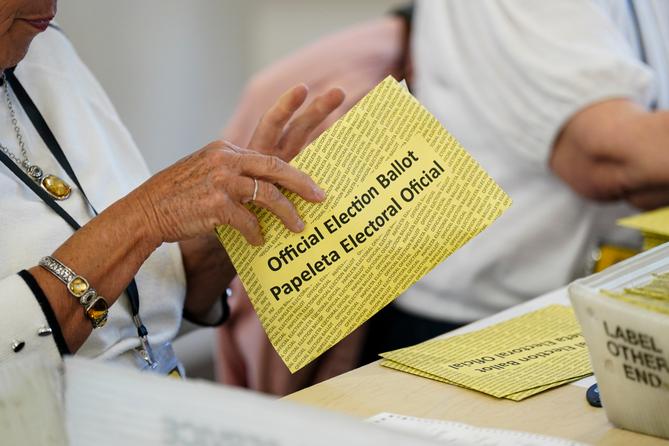This article is made possible through Spotlight PA’s collaboration with Votebeat, a nonpartisan news organization covering local election administration and voting. Sign up for Votebeat's free newsletters here.
A Western Pennsylvania county that rejected hundreds of mail ballots in the April primary should have notified voters beforehand, a state appellate court ruled Tuesday. The ruling could add pressure on other counties to notify voters of errors for the November election.
In a 2-1 decision, a Commonwealth Court panel agreed with a lower court judge that Washington County erred when it adopted a policy to reject mail ballots without telling voters and had a duty to inform them of their errors.
“The current policy emasculates the Election Code’s guarantees by depriving voters … the opportunity to contest their disqualification or to avail themselves of the statutory failsafe of casting a provisional ballot,” Judge Michael Wojcik wrote for the majority.
The decision applies to Washington County and does not set a statewide legal precedent, but county attorneys are likely to take note of the court’s opinion when advising their boards of elections about how to handle mail ballots with errors.
The decision can be appealed to the state Supreme Court, where a ruling would have statewide effect.
The case was brought by the American Civil Liberties Union of Pennsylvania and the Public Interest Law Center on behalf of voting rights groups and voters whose ballots were rejected under the policy.
“Voters in Washington County can be assured that, if they make a mistake with their mail ballot, they’ll be notified and have a chance to rescue their vote,” said Claudia De Palma, senior attorney at the Public Interest Law Center. “That’s a win for voters.”
Before this year’s April primary election, the Republican majority on Washington County’s board of elections opted not to notify voters of mistakes with their mail ballots that would cause their votes to be disqualified, such as a missing date or signature, or being returned without a secrecy envelope.
The Pennsylvania Supreme Court ruled in 2020 that state law didn’t require counties to notify voters and give them a chance to fix the error, but it didn’t say that the practice was prohibited either. As a result, many counties adopted such a process, referred to as “notice and cure.” At least 14 counties now do this.
Many others say they do not have notice and cure policies, or have not answered questions about their policy.
But unlike other counties without notice and cure policies, Washington County gave voters no warning if their ballot had a defect that would result in it being rejected, even though it acknowledged receiving them.
When Washington County received a mail ballot back from a voter, it used only generic codes in the state’s ballot tracking system to indicate the ballot had been received, rather than more specific codes that could indicate whether there is an issue that prevents the ballot from being counted. These codes generate distinct emails to voters, and the more specific codes would have generated emails that informed voters their ballots were at risk of rejection.
Ultimately, the county rejected 259 ballots during the primary for issues with a signature or date on the outer envelope, or being returned without an inner secrecy envelope. Statewide, roughly 8,500 ballots, or 1.22% of those returned, were rejected for one or more of those errors, according to an analysis of Pennsylvania Department of State data.
The ACLU and Public Interest Law Center sued the county — on behalf of seven voters, the local NAACP branch, and the Center for Coalfield Justice — arguing that by not informing the voters that their ballots were at risk of rejection, the county had violated the voters’ constitutional due process rights and denied them the opportunity to challenge the decision or cast provisional ballots.
Washington County Court of Common Pleas Judge Brandon Neuman agreed with the organizations, writing that under the state Election Code, voters have a right to challenge the decision by a county board of elections to reject their ballot, and to cast a provisional ballot. If they don’t know their ballot was rejected, he wrote, they can’t exercise those rights.
He ordered the county to change its process for what codes it uses when receiving ballots, so voters better understand that their ballot is at risk of rejection.
Washington County appealed the decision to Commonwealth Court, joined by state and national Republican groups that had intervened in the case.
Nick Sherman, the Republican chair of the county’s board of commissioners, did not immediately return calls or emails seeking comment on whether the county would appeal to the Pennsylvania Supreme Court.
The Pennsylvania GOP and the Republican National Committee also did not reply to a request for comment.
Under new rules that the Supreme Court established last month to resolve election disputes quickly, an appeal must be filed within three days.
The case is part of a flurry of litigation to be resolved before the November election over which mail ballots should be counted in Pennsylvania, a crucial swing state with a tight race between presidential candidates Kamala Harris and Donald Trump.
In a case from another western Pennsylvania county, the state Supreme Court is weighing whether counties should have to count provisional ballots cast in person by voters whose mail ballots were rejected for reasons such as lacking a secrecy envelope.
Carter Walker is a reporter for Votebeat in partnership with Spotlight PA. Contact Carter at cwalker@votebeat.org.
BEFORE YOU GO… If you learned something from this article, pay it forward and contribute to Spotlight PA at spotlightpa.org/donate. Spotlight PA is funded by foundations and readers like you who are committed to accountability journalism that gets results.

